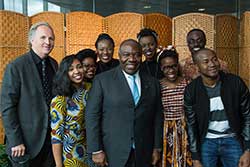A new body started this year with the ambition to raise the quality and quantity of Africa’s research output, the Alliance for Accelerating Excellence in Science in Africa or AESA, is launching a new initiative to develop continental standards and transparency in managing donor research funds in universities, research institutions and governments.
“Development has commenced of a new pan-African standard which will be called Good Financial Grant Practice,” said Michael Kilpatrick, senior advisor to the Good Financial Grant Practice – GFGP – programme at the African Academy of Sciences in Nairobi, Kenya.
The GFGP aims to promote best practice in the management of funds awarded to recipients.
It is an offshoot of the International Financial Governance Working Group founded in 2012 by some major funders of research and international aid in Africa – the Medical Research Council in the United Kingdom, the European and Developing Countries Clinical Trials Partnership, the Wellcome Trust and the Swedish International Development Cooperation Agency.
The working group, according to Kilpatrick, is to identify and agree on ways for funders to have a more unified approach to tackling financial management challenges faced by both funders and fund recipients in Africa.
He said common challenges included funders independently carrying out pre-award assessments, having different reporting requirements, and separately undertaking post project audits.
The new tool seeks to scrap recipients’ multiple assessments, audits and inconsistent requirements from funders, which add strain on recipient institutions’ finance functions, which are already under-funded and under-resourced.
“It was agreed there needed to be a paradigm shift to address these challenges,” Kilpatrick told University World News.
The programme
He said the African Academy of Sciences was chosen to host the GFGP programme using AESA as a delivery vehicle. The Wellcome Trust and the UK Medical Research Council are contributing towards the new two-year initiative.
A GFGP suitable for institutions in Africa will be developed by both funders and recipients. A web-based Financial Management Assessment Tool or GFGP-FMAT will also be created to support self-assessments by recipients, and funders will have access to a searchable database of FMAT assessments.
“Pan-African adoption of the GFGP standard will ultimately lead to a process of certification of the financial functions of institutions,” Kilpatrick said, adding that this will enable funders to be confident that an institution is operating transparently.
The GFGP standards and GFGP-FMAT tool will be designed for use in various sectors, such as governmental and charitable funded aid programmes in Africa. The burden of audits and associated costs for fund recipients and their institutions will be reduced, and funders will enjoy lower administration costs and greater assurance that their funding is correctly used.
Kilpatrick said a series of workshops will be held in early 2016 to allow financial representatives from a broad spectrum of institutions across Africa who are or have been recipients of funds, to contribute views on what the GFGP standard should look like.
The proposed content and structure of the new GFGP standard will then be discussed in workshops with funder communities in Europe and the United States for their input.
It is expected that a draft will be completed in mid-2016 and that the new pan-African standard will be published by late 2017 for adoption by African national standards boards.

